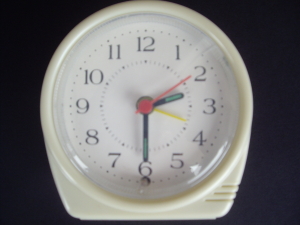Blog 17: As Time Goes By
Though, according to one doctor, the “turns” described in Blog 16 were more akin to epilepsy than to mini-strokes, they had the same effect as mini-strokes in that they always contributed to noticeable loss of brainpower. Ultimately, however, not being able to measure, or handle money, or write sentences, did not cause us too much angst. I could do all those things for Bill that he now couldn’t do and, if I didn’t have the skills, we were always able to pay someone to do the job for us. The ongoing loss of spoken language, however, caused Bill much more pain and he would say, quite often: I wish I could talk to people. That loss could be both isolating and embarrassing and sometimes, just downright agonising for him. But there was another loss that caused him great stress that I want to tell you about. And that loss was the loss of his ability to tell time.
Telling time is rather a complex process. These days we have analogue, digital and twenty-four hour time to cope with, and a clock face, such as the one below, can be read as two-thirty, am or pm, as half-past two, am or pm, or as fourteen thirty.
As well, there is a confusing second hand spinning around this clock face, and another to tell you at what time the alarm will sound.
By the end of 2009, Bill had lost, completely, the ability to tell time in any of these ways, except for time by the hour, using the analogue clock. We went through our usual procedure of trying to relearn the learning. We bought extra clocks and put them all around the house so that Bill would see them every few minutes. We brought clock faces down from the toy room, moved the hands and practised telling time by the hour and the half-hour. I brought time phrases into our conversations:
“It’s nine o’clock,” I would say, pointing to the clock. “We’ll get ready to go shopping.”
But, as I’ve said before, it always ended up the same way. The learning would come back for a short time but, before long, it would be gone completely, never to return again. And, eventually, for Bill, even time by the hour had disappeared. His ability to tell time had gone into that big, black hole that had claimed, already, all his other literacy and numeracy competencies. Unlike the loss of the abilities such as reading calendars and maps, however, this loss of ability to tell time had negative effects on our lives that disrupted and upset them.


Pierrette GAgnon
Dear Fay,
Thank you for sending your observations of Bill during these last years of his life. I read all your blogs and correspondence with great interest as my father also suffered from that for the last 6 years of his life. He died at 96 so started much later than Bill who was still quite young. You brought back many memories of him as I read Bill’s story. Bill certainly enjoyed his time here in PNG. I will try to find pictures of him, I did not notice that he had signs of dementia when he came, if it was started, it must have been very mild at that time. I will continue reading with much interest. You are a good writer! Regards, Sr Pierrette
Fay
Dear Sr Pierette,
It’s so good to hear from you and I trust your eyesight is still serving you well. It was interesting to hear that your father had dementia in his last years and he did jolly well to make it to 96 years. As you know, there are different dementias. Alzheimers disease is the most common, followed by Vascular Dementia, which is the type that Bill had ……. “a cognitive impairment defined by damage to, or blockages of, the blood vessels in the brain” (Jon Barron’s National Health Blog) …… and one which mostly affects people between the ages of 65 and 75. My guess is that your father died of that other dementia that they call “Senile Dementia”. Thank you for taking the time to answer. I know you are a busy woman.
Sonia Hendy
Fay, You always said Bill would get ready for Rotary or other occasions many hours before time. Did this in any way relate to his inability to tell the time?
Fay
It did indeed, Sonia. And the next blog, which should be up any minute, deals with the way inability to tell time affected Bill’s behaviour as he became further demented. Thank you for continuing to read and for commenting.
Harold and Nola
Such a small thing, telling the time. I remember Dad taking time with me as a child to teach me to read the clock dial. Fortunately, in those days, I was a reasonably quick learner and to read of Bill sort of going ‘backwards’ like this has brought all that back. How precious memory is, and how sad to lose it thus. Nola.
Fay
It was like that with all learning, Nola. Bill’s written language loss, for example, echoed, in reverse, the way children progress with that learning. Firstly, you would notice that he would write “hear” instead of “here”. Then you would notice that the “Magic e rule” had gone and he would write “hol” for “hole”, and so on and so on. Written language did not disappear over night. It went backwards, step by step, in the same way that children move forward.